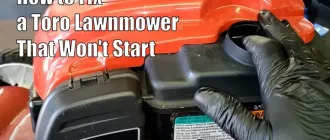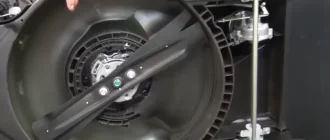Imagine this scenario: You’re enjoying a sunny afternoon in your garden, ready to give your lawn a quick trim. You turn on your trusty lawnmower, and suddenly there’s a loud pop followed by a puff of smoke. Your trusty tool has just backfired, turning your serene afternoon into a frustrating ordeal.
A lawn mower engine backfire is no doubt a frustrating experience. It not only disrupts your peaceful gardening time but could also potentially harm your mower’s engine. Besides the startling noise, engine backfire could suggest an underlying problem with your machine and could escalate to costly damage if not addressed promptly.
Fortunately, you don’t have to be an expert mechanic to fix a backfiring lawnmower. With a basic understanding of common causes and how to rectify them, you can quickly troubleshoot the problem and get back to your garden activity. So, let’s dive into some common culprits of lawn mower engine backfire and how to resolve them.

Causes of Lawn Mower Engine Backfire
Gardening, while rewarding, can unexpectedly turn into troubleshooting sessions when your lawnmower starts backfiring. Identifying why your lawn mower is backfiring is the first step towards rectifying the issue, and it often comes down to a couple of common reasons.
Engine temperature: The impact of hot or cold conditions
Temperature Variances: Sometimes, temperature variations lead to engine backfire. For instance, if your lawnmower engine is too hot and you suddenly turn it off, it can cause the gasoline in the engine to ignite, resulting in a backfire. Likewise, if the engine is very cold, it might not completely burn the fuel, leading to a similar issue.
Fuel-related issues: Using the wrong type of gas or fuel mixture
Fuel Concerns: Fuel-related problems are another significant cause of lawnmower backfiring. Using the wrong type of fuel, contaminated gasoline, or an incorrect air-to-fuel ratio can all trigger your engine to backfire. It’s important to only use high-quality, clean fuel and maintain the right fuel mixture to prevent such issues.
Understanding these basic causes and how to properly maintaining your lawnmower can save you from the trouble of backfires and help keep your gardening experience pleasant and rewarding.
Fixing a Lawn Mower Engine Backfire
When dealing with a lawnmower engine backfire, tackling the common issues of engine temperature and fuel-related problems can be a good starting point. Let’s delve into some steps for preventing backfires and maintaining the health of your lawnmower.
Cooling Down the Engine: Steps to Prevent Backfires
It’s important not to suddenly turn off a hot lawnmower engine as it can cause the gasoline in the engine to ignite, resulting in a backfire. Instead, allow it to idle for several minutes so that it cools down before turning it off. For cold engines, let the mower run for a while before operating it. This warms the engine up and ensures the fuel burns completely, significantly reducing the chances of backfiring.
Checking and Maintaining the Oil Level and Filters
Regularly checking and maintaining suitable oil levels can extend your lawnmower’s life and improve its efficiency. If oil levels are too low, add to the marked level on your dipstick, but be careful not to overfill. Filters are equally important. A clean, well-performing filter supports ideal air-to-fuel ratio, enhancing engine performance. Replace or clean dirty filters and ensure they fit snugly in place to prevent engine backfire.
By taking these preventative steps, you can keep your lawnmower running smoothly and enjoy a trouble-free gardening experience.
Other Possible Causes and Solutions
Fuel system problems: Clogged lines or faulty spark plugs
Aside from engine temperature issues, lawnmower engine backfires can also be caused by fuel system problems. Two common culprits are clogged fuel lines and faulty spark plugs.
Clogged fuel lines can prevent the correct amount of fuel from reaching the engine, causing it to run lean and potentially backfire. To fix this, you can try cleaning the fuel lines or, if necessary, replacing them altogether.
Another potential problem lies in the spark plugs. Faulty spark plugs can misfire or cause incomplete combustion, leading to backfires. Regularly inspecting and cleaning or replacing the spark plugs can help solve this issue.
Regular maintenance: Preventive measures to avoid backfires
Prevention is always better than cure when it comes to lawnmower engine backfires. Here are some preventive measures you can take to avoid this issue:
- Clean or replace air filters: Dirty or clogged air filters can disrupt the air-to-fuel ratio and affect engine performance. Regularly clean or replace air filters to ensure optimal combustion.
- Use fresh fuel: Old or stale fuel can lead to poor combustion and backfires. Always use fresh fuel and avoid storing it for extended periods.
- Maintain proper oil levels: Low oil levels can put stress on the engine and lead to backfires. Regularly check and maintain suitable oil levels as recommended by the manufacturer.
- Keep the mower clean: Debris and grass clippings can accumulate in the mower’s engine, causing airflow issues. Regularly clean the mower to prevent this buildup.
By following these preventive measures and addressing any fuel system problems promptly, you can keep your lawnmower running smoothly and avoid the frustration of engine backfires.
When Trying to Start
When you’re trying to start your lawnmower and it backfires, it can be frustrating and worrisome. Understanding the common causes of engine backfires and how to fix them can help you get your lawnmower running smoothly again.
One possible cause of a backfire when trying to start the lawnmower is a fuel system problem. Clogged fuel lines or faulty spark plugs can disrupt the proper fuel-to-air ratio, leading to backfires. To fix this, start by checking the fuel lines for any clogs. If you find any, clean them thoroughly or consider replacing them if necessary. Additionally, inspect the spark plugs for any signs of wear or damage. Faulty spark plugs can misfire and cause backfires, so cleaning or replacing them can help resolve the issue.
Regular maintenance is also crucial for preventing engine backfires. Cleaning or replacing air filters regularly ensures optimal combustion by maintaining the correct air-to-fuel ratio. Using fresh fuel and avoiding storing it for extended periods prevents poor combustion and potential backfires. Additionally, keeping proper oil levels and regularly cleaning the mower to prevent debris buildup can help avoid airflow issues that can lead to backfires.
By addressing these common causes and following preventive measures, such as regular maintenance, you can keep your lawnmower running smoothly and prevent the frustration of engine backfires.
Through Carburetor
Experiencing a backfire when starting your lawnmower can be both frustrating and worrisome. One common cause of this issue is a problem in the carburetor. The carburetor is responsible for mixing the correct amount of fuel and air for combustion. If this process is disrupted or if there is an imbalance in the fuel-to-air ratio, it can result in backfires.
To fix this issue, start by inspecting the carburetor for any blockages or dirt buildup. Clean the carburetor thoroughly, ensuring that all passages and jets are clear. If necessary, you may need to disassemble the carburetor for a more thorough cleaning. Additionally, check the carburetor gaskets and seals for any signs of damage or wear, as these can contribute to improper fuel mixtures.
Another step to consider is adjusting the carburetor settings, such as the idle speed and mixture. Refer to the lawnmower’s manual for specific instructions on how to make these adjustments. It is important to note that improper carburetor adjustments can lead to engine damage, so consult a professional if you are unsure.
By addressing carburetor issues and ensuring regular maintenance, such as cleaning and adjusting, you can prevent engine backfires and keep your lawnmower running smoothly.
In Kawasaki Models
Experiencing a backfire in your lawn mower engine, specifically in Kawasaki models, can be frustrating and worrisome. Kawasaki engines are known for their reliability and high performance, but even the best engines can encounter issues from time to time. Here, we will discuss the common causes of engine backfire in Kawasaki models and provide some guidance on how to fix them.
One common cause of engine backfire in Kawasaki models is a problem with the carburetor. The carburetor is responsible for mixing the correct amount of fuel and air for combustion. If there are blockages or dirt buildup in the carburetor, it can disrupt the fuel-to-air ratio and result in backfires. To fix this issue, inspect the carburetor and clean it thoroughly. Check all the passages and jets to ensure they are clear. If necessary, you may need to disassemble the carburetor for a more thorough cleaning. Additionally, inspect the carburetor gaskets and seals for any signs of damage or wear, as these can also contribute to improper fuel mixtures.
Another potential cause of engine backfire in Kawasaki models is an issue with the ignition system. If the spark plug is worn out or improperly gapped, it can cause misfires and backfires. Check the spark plug and replace it if necessary. Also, inspect the ignition coil and ensure it is properly connected and functioning correctly.
In Honda Models
Dealing with engine backfire in your lawn mower, particularly in Honda models, can be worrisome and frustrating. While Honda engines are known for their reliability and performance, they can encounter issues, including backfires. In this section, we will discuss the common causes of engine backfire in Honda models and provide some guidance on how to fix them.
One of the main causes of engine backfire in Honda models is a problem with the carburetor. The carburetor is responsible for mixing the correct amount of fuel and air for combustion. If the carburetor is dirty or has blockages, it can disrupt the fuel-to-air ratio and cause backfires. To address this issue, inspect the carburetor and clean it thoroughly, ensuring that all passages and jets are clear. If necessary, disassemble the carburetor for a more comprehensive cleaning. Additionally, check the carburetor gaskets and seals for damage or wear, as these can also contribute to improper fuel mixtures.
An issue with the ignition system could be another possible reason for engine backfire in Honda models. Misfires and backfires can occur if the spark plugs are old or have the incorrect gap. Examine the spark plug and replace it if necessary. Additionally, check the ignition coil to guarantee it is properly connected and operating accurately.
In Honda Models
Dealing with engine backfire in your lawn mower, especially in Honda models, can be a frustrating and worrisome experience. While Honda engines are known for their reliability and performance, they can encounter issues, including backfires. In this section, we will explore the common causes of engine backfire in Honda models and provide guidance on how to fix them.
Problems with the Carburetor
One of the main culprits behind engine backfire in Honda models is a problem with the carburetor. The carburetor is responsible for mixing the perfect amount of fuel and air for combustion. If it becomes dirty or has blockages, it can disrupt the fuel-to-air ratio and result in backfires. To address this issue, carefully inspect the carburetor and clean it thoroughly, ensuring that all passages and jets are clear. If needed, disassemble the carburetor for a more thorough cleaning. Additionally, check the gaskets and seals of the carburetor for any damage or wear, as they can also contribute to improper fuel mixtures.
Issues with the Ignition System
Another potential cause of engine backfire in Honda models is a problem with the ignition system. Worn-out or improperly gapped spark plugs can lead to misfires and backfires. Check the spark plug and replace it if necessary. Also, inspect the ignition coil and ensure it is properly connected and functioning correctly.
To prevent engine backfires in Honda models, it is important to perform regular maintenance tasks such as cleaning and adjusting the carburetor. Additionally, proper maintenance of the ignition system is crucial. If you are unsure about any maintenance procedures or need further assistance, it is recommended to consult a professional for guidance. By addressing these common causes of engine backfire, you can keep your Honda lawn mower running smoothly and efficiently.
Related FAQs
As you navigate the challenges of dealing with engine backfire in Honda models, you may have some questions. Here, we address some frequently asked questions to provide further guidance and support.
1. What are the common causes of engine backfire in Honda models?
Engine backfire in Honda models can be caused by various factors. Problems with the carburetor, such as dirt or blockages, can disrupt the fuel-to-air ratio. Issues with the ignition system, including worn-out spark plugs or faulty ignition coils, can also lead to backfires.
2. How can I clean and maintain the carburetor to prevent engine backfires?
Regular cleaning and maintenance of the carburetor is crucial. Carefully inspect the carburetor and clean it thoroughly, ensuring that all passages and jets are clear. If necessary, disassemble the carburetor for a more thorough cleaning. Additionally, check the gaskets and seals for any damage or wear.
3. What should I do if I suspect a problem with the ignition system?
If you suspect a problem with the ignition system, start by checking the spark plug. Replace it if necessary and ensure it is properly gapped. Inspect the ignition coil and make sure it is properly connected and functioning correctly. If you are unsure about any maintenance procedures or need further assistance, it is recommended to consult a professional for guidance.
4. How can I keep my Honda lawn mower running smoothly and efficiently?
To keep your Honda lawn mower running smoothly and efficiently, it is important to perform regular maintenance tasks. This includes cleaning and adjusting the carburetor, as well as maintaining the ignition system. Following the manufacturer’s guidelines and consulting a professional when needed can help ensure optimal performance.






